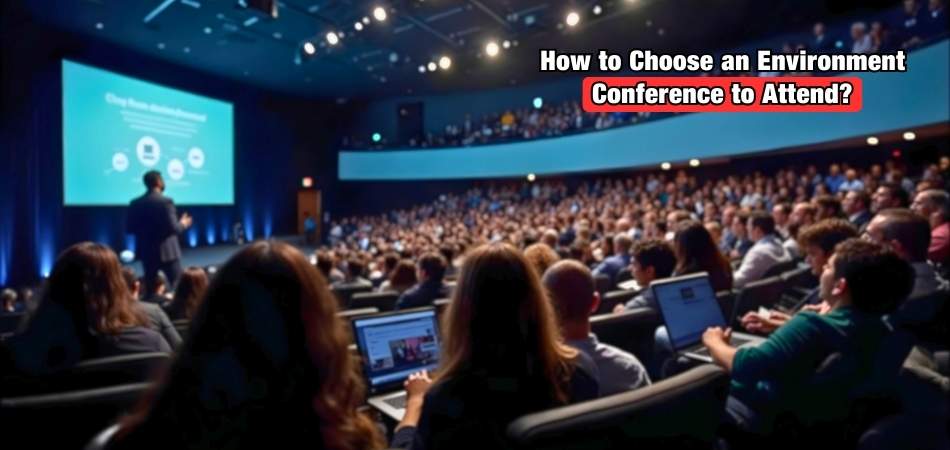The opportunity to participate in an environment conference provides an excellent platform for engaging in sustainability initiatives and connecting with people who share your interests. With so many events available, you might be confused about how to choose an environment conference to attend?
To select the right conference, start by identifying your objectives, whether they involve networking, gaining knowledge, or exploring innovations. Review the agenda, assess the organizers’ credibility, and ensure the event format suits your needs. Aligning the conference with your goals ensures a meaningful and productive experience.
Curious to learn more? This article provides detailed insights and practical tips to help you make an informed decision. Discover how to pick the perfect environment conference and get the most out of your participation.
Significance of Choosing the Right Environment Conference
Choosing the right environment conference is crucial for professionals and organizations dedicated to sustainability. These events offer opportunities to network with experts, exchange ideas, and gain insights into innovative solutions addressing climate challenges. A well-chosen conference can serve as an engine for meaningful change in policy, practice, or research.
Environment conferences held in different countries provide different perspectives relating to regional issues. Events in Europe often emphasize green technology, while Asian conferences may focus on rapid urbanization and its environment impact. North American events frequently highlight biodiversity conservation and clean energy innovation. This diversity enables attendees to become familiar with environment challenges and solutions.
Among these, attending an international environmental conference in Canada can be particularly impactful. Canada’s focus on sustainable development, conservation, and indigenous knowledge integration offers attendees invaluable insights, promoting collaboration across borders for a greener future.
How to Choose an Environment Conference to Attend?
Your learning experience and professional development can be maximized if you choose the right conference environment. With so many options available, you should carefully consider your goals and the event’s offerings. Here are key factors to guide your decision-making process.
Define Your Objectives
Start by identifying what you want to achieve from attending the conference. Are you looking to network, learn about specific topics, or gain insight into advanced technologies? Clarifying your goals will help you focus on events that align with your professional or personal aspirations, ensuring a meaningful experience.
Evaluate the Conference Agenda
Review the conference agenda to assess its relevance to your interests. Look for sessions, workshops, and keynote speakers that address the issues you care about most. A well-curated agenda with diverse topics and expert presenters can provide valuable knowledge and actionable insights.
Consider the Conference Format
Decide whether you prefer an in-person, virtual, or hybrid format. In-person conferences offer richer networking opportunities, while virtual events provide flexibility and cost savings. Hybrid events combine both formats, allowing you to participate based on your availability and preferences.
Research the Organizers
The reputation of the organizing body is a key factor in choosing the right conference. Established organizations are more likely to attract high-quality speakers and attendees, ensuring a rewarding experience. Look into the organizer’s past events, feedback from attendees, and overall credibility in the environment field.
Assess the Networking Opportunities
Networking is often a primary reason for attending conferences. Check if the event includes dedicated networking sessions, breakout groups, or social activities. Conferences that encourage collaboration and provide platforms for interaction are ideal for building lasting connections and partnerships.
Evaluate the Location and Budget
If the conference is in-person, consider its location and accessibility. Choose a destination that aligns with your travel preferences and budget. Factor in costs such as registration fees, accommodations, and transportation to ensure the event fits within your financial plans.
Check Testimonials and Reviews
Feedback from past attendees can offer valuable insights into the conference’s quality and impact. Look for testimonials or reviews that highlight the event’s strengths and areas for improvement. This information helps you make an informed decision about whether the conference meets your expectations.
Align with Your Field of Work or Study
Ensure the conference topics align with your professional or academic focus. Specialized conferences that align with your niche are often more impactful than general events. Attending a relevant conference allows you to gain insights that directly apply to your work or research.
Choosing the right environment conference is an essential step toward advancing your knowledge, networking, and contributing to sustainability goals. If you’re considering a global perspective, an environmental conference in Canada in 2025 could be an excellent opportunity to explore recent strategies and innovations while connecting with industry leaders.
Key Benefits of Participating in an Environment Conference
Participating in an environment conference offers numerous advantages for professionals, students, and advocates passionate about sustainability. These events serve as a hub for innovation, networking, and learning. Here are the key benefits of attending an environment conference.
Expanding Knowledge and Awareness
Environment conferences provide a platform to learn about pressing issues like climate change, conservation, and sustainable technologies. Experts share the latest research, trends, and case studies, helping attendees stay informed about global challenges. These insights empower participants to apply new knowledge in their work or initiatives.
Networking with Industry Leaders
One of the standout benefits is the opportunity to connect with experts, policymakers, and like-minded professionals. Conferences often include networking sessions, social events, and interactive workshops. Building these connections can lead to collaborations, mentorship opportunities, and career growth in the environment field.
Discovering Innovative Solutions
Environment conferences showcase cutting-edge technologies, tools, and practices aimed at solving environment problems. Attendees explore solutions ranging from renewable energy advancements to waste management innovations. Learning about these developments is among the most practical benefits of attending an environmental conference, providing actionable ideas for implementation.
Enhancing Professional Skills
Workshops and hands-on sessions at conferences help attendees refine their skills in areas such as policy advocacy, project management, and community engagement. These practical experiences are designed to provide a connection between theory and application, making attendees more effective in their roles.
Inspiring Action and Advocacy
Hearing success stories and impactful projects motivates participants to take action. Whether it’s adopting sustainable practices or initiating new projects, the inspiration gained at conferences fuels advocacy efforts. These events create a sense of shared purpose, empowering attendees to contribute to global sustainability goals.
Contributing to Collective Solutions
Environment conferences emphasize collaboration and shared responsibility for addressing ecological challenges. By participating in discussions and panels, attendees contribute their perspectives and gain insights from diverse viewpoints. This collective problem-solving approach enriches the overall impact of environment initiatives.
Environment Conferences: Who Should Attend?
Environment conferences bring together individuals and organizations from diverse fields to address sustainability challenges and share innovative solutions. These events are ideal for anyone passionate about protecting the planet or working toward a sustainable future. Here’s who should participate and why.
Environment Professionals and Researchers
Experts in fields such as ecology, climate science, and renewable energy should attend these conferences to share their findings and collaborate with peers. These events provide a platform to present research, explore advancements, and stay updated on emerging trends. For professionals, it’s an opportunity to connect with others in the field and contribute to the development of impactful solutions.
Policymakers and Government Officials
Policymakers play a crucial role in implementing sustainable practices and environment laws. Attending conferences allows them to engage with experts, gain insights into global trends, and understand the needs of various stakeholders. This knowledge helps shape informed decisions that promote sustainability at local, national, and international levels.
Businesses and Industry Leaders
Companies looking to adopt eco-friendly practices or explore sustainable innovations can benefit greatly from these events. Industry leaders can learn about new technologies, collaborate on green initiatives, and showcase their sustainability efforts. Conferences also help businesses align with environment regulations and upgrade their corporate social responsibility (CSR) strategies.
Educators and Students
Educators and students interested in environment topics should participate to expand their knowledge and network with professionals. For students, these conferences provide exposure to career opportunities, internships, and mentorships in sustainability-focused fields. Educators can bring back valuable insights to inspire their students and improve their curricula.
Community Activists and Nonprofit Organizations
Community leaders and NGOs focused on environment advocacy should attend to amplify their voices and collaborate with like-minded individuals. Conferences offer resources and connections that help these organizations implement impactful projects. Sharing experiences and learning from others advances stronger community-based initiatives.
Anyone Passionate About the Environment
Individuals who care about sustainability, regardless of their professional background, are welcome at these events. Whether you’re looking to learn, connect, or take action, conferences provide an inclusive platform for anyone dedicated to making a difference.
Environment conferences are for anyone invested in creating a sustainable future. From experts to everyday advocates, these events provide opportunities to learn, collaborate, and contribute to meaningful change.
Tips for Maximum Environment Conference Experience
Making the most of a conference requires a proactive approach and thoughtful planning. Here are some practical tips to help you fully engage and maximize your experience.
- Set Clear Goals: Define what you want to achieve from the conference, whether it’s networking, learning specific skills, or exploring new ideas. Having clear objectives helps you stay focused and make the most of your time.
- Plan Your Schedule in Advance: Review the agenda before the event and prioritize the sessions, workshops, and activities that align with your goals. A well-structured plan ensures you don’t miss out on key opportunities.
- Engage Actively During Sessions: Participate in discussions, ask questions, and take detailed notes. Engaging actively enriches your knowledge and leaves a lasting impression on speakers and attendees.
- Network with Purpose: Introduce yourself to fellow participants and engage in meaningful conversations. Be prepared with an elevator pitch to share your background and interests effectively.
- Visit Exhibits and Demonstrations: Spend time exploring exhibition booths to learn about the latest technologies, products, and research. These areas are often hubs for discovering practical solutions and innovative ideas.
- Take Care of Yourself: Conferences can be long and intense, so ensure you stay hydrated, take breaks, and have snacks on hand. Being comfortable helps you remain focused and energized throughout the event.
- Be Open to New Ideas: Approach the conference with an open mind and a willingness to explore diverse perspectives. This mindset allows you to gain fresh insights and think creatively about solutions.
- Follow-Up After the Event: Reach out to the people you connected with and review your notes to solidify what you’ve learned. Following up helps maintain relationships and turn knowledge into action.
FAQs
There are a lot of options when it comes to choosing an environment conference. Here are answers to frequently asked questions to help you make an informed choice and maximize the value of your conference experience.
What Factors Should You Consider for Environment Conference Accessibility?
When choosing an environment conference, assess its accessibility in terms of location, venue, and inclusivity. Ensure the venue is convenient for travel and accommodates diverse needs, including accessibility for individuals with disabilities. Virtual options may also increase accessibility and convenience.
How Do You Identify Conferences with Reliable Speakers?
Review the list of keynote speakers and panelists to ensure they are credible experts in their fields. Research their backgrounds and previous presentations to determine their relevance to the topics you’re interested in. This guarantees high-quality insights during the event.
How Can Smaller Conferences Be More Beneficial Than Larger Ones?
Smaller conferences often provide more personalized networking and interaction opportunities. They allow for deeper connections with speakers and attendees, promoting meaningful dialogue. Consider a smaller event if you prefer focused discussions and greater engagement in workshops or sessions.
How Important Is Timing When Choosing a Conference?
Timing can significantly impact your experience. Ensure the conference aligns with your schedule to avoid conflicts. Also, check if the event timing coincides with relevant environment milestones or initiatives to maximize its value and applicability.
Should You Look for Conferences Offering Post-Event Resources?
Yes, post-event resources such as session recordings, materials, or networking follow-ups improve the learning experience. These allow you to revisit key insights and maintain connections, making the event’s impact long-lasting and more actionable in your professional or personal pursuits.
Final Thought
Choosing a conference requires you to define clear objectives, evaluate agendas, and learn about formats when choosing a conference. By aligning your needs with the event’s offerings, you now know how to choose an environment conference to attend that maximizes learning, networking, and professional growth.
To make the most of your experience, stay prepared, engage actively, and follow up with connections afterwards. With thoughtful planning, you’ll find meaningful opportunities to grow and contribute. Best wishes as you explore, learn, and make a difference!








